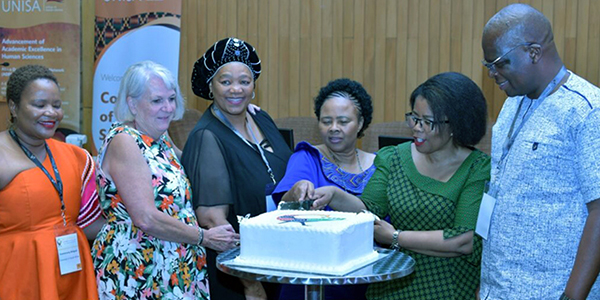College of Economic & Management Sciences
Unisa co-hosts major operations management conference

Prof Barnes Sookdeo (Department of Operations Management: Unisa) and Bupe Getrude Mutono-Mwanza (Best Paper Award winner: University of Zambia)
With a focus on shaping Africa’s industrial future through innovation, collaboration and strategic dialogue, the 4th African Operations Management Conference (AOMC) convened leading academics, government leaders and industry experts from across the continent and beyond. The event was co-hosted by Unisa’s Department of Operations Management and the Department of Quality and Operations Management at the University of Johannesburg (UJ). It took place from 4 to 6 August 2025 at Glenburn Lodge in Muldersdrift, Johannesburg.

Prof Anthea Amadi-Echendu (Chair of the AOMC Committee, CEMS: Unisa)
Held under the theme "Industry 4.0 and Beyond: The Quest for Operations Excellence", the three-day event addressed critical issues in operations management, ranging from artificial intelligence and digital twins to sustainability, productivity and the evolving nature of African industries.
Prof Anthea Amadi-Echendu, Chair of the AOMC Committee and Professor in Unisa’s Department of Operations Management, described this year’s keynote line-up as one of the most impactful to date: "This year’s speakers added immense value to the field of operations management in Africa. We had strong government representation, two international keynotes, and a European panel. The discussions held here will drive real change. From AI to Industry 4.0, we’re not only talking about the future, we are shaping it."
The conference featured a dynamic programme of keynote presentations, topical paper sessions, panel discussions and an awards ceremony celebrating research excellence.
Keynote addresses were delivered by
- The Honourable Judith Nemadzinga-Tshabalala, the Deputy Minister of Employment and Labour.
- Prof Geoff Banda, the Head of Subject Area and Senior Lecturer in the Science, Technology, and Innovation Studies Group at the University of Edinburgh.
- Prof Jenny Bäckstrand, the Vice-President and incoming President of the International Purchasing and Supply Education and Research Association (IPSERA).
- Prof Bingwen Yan, the Head of the Department of Industrial and Systems Engineering within the Faculty of Engineering and the Built Environment at the Cape Peninsula University of Technology.
Watch a recording of the proceedings
Celebrating academic excellence: 2025 AOMC Awards Ceremony
One of the conference's highlights was the Gala Dinner and Awards Ceremony, held on the second evening of the event. Exceptional academic contributions were recognised in various categories.
Award winners:
- Best PhD Proposal: Anand Khelawon
- Best Master’s Proposal: K. Bhebhe
- Best Paper Awards: Dr Ngaka Mosia, Unisa, and Bupe Getrude Mutono Mwanza, University of Zambia
- Productivity Champion: Dr Boysana Mbonyane
"The research presented was locally relevant yet globally informed, offering real-world applications for African industries, public services, healthcare, and SMEs," said Amadi-Echendu. "It is heartening to see such forward-looking scholarship emerging from our continent."

Hon Judith Nemadzinga-Tshabalala (Deputy Minister of Employment and Labour)
She continued: "Numerous papers addressed challenges and opportunities specific to African contexts. This ensured that the knowledge shared was both practical and regionally grounded."
She also said that the emphasis on topics like AI, Digital Twins, Industry 4.0, and digital transformation indicates a forward-looking approach, encouraging African organisations to adopt advanced operational strategies to improve efficiency, productivity, and competitiveness as well as the conference's commitment to integrating sustainability and social responsibility into operations management practices relevant for African development.
In her vote of thanks, Dr Mantepu MaseTshaba, Acting Executive Dean of the College of Economic and Management Sciences (CEMS) at Unisa, thanked both partner institutions for a successful event. "It is an absolute privilege to share this moment with you, as we reflect on the evolving field of operations management and its role in shaping industrial futures," she said. "The past decade has been transformative, driven by Industry 4.0. technologies like AI, intelligent data analytics, and predictive modelling, are revolutionising how we operate. This conference has shown that Africa is not on the sidelines – we are in the arena, leading change."
* By Tebogo Mahlaela, Communication and Marketing Specialist, College of Economic and Management Sciences
Publish date: 2025/08/27

 Unisa co-hosts G20 community outreach in the Eastern Cape
Unisa co-hosts G20 community outreach in the Eastern Cape
 Unisans gain membership of prestigious science academies
Unisans gain membership of prestigious science academies
 Advocating for disability transformation through servant leadership
Advocating for disability transformation through servant leadership
 Unisa Press continues to illuminate the publishing space
Unisa Press continues to illuminate the publishing space